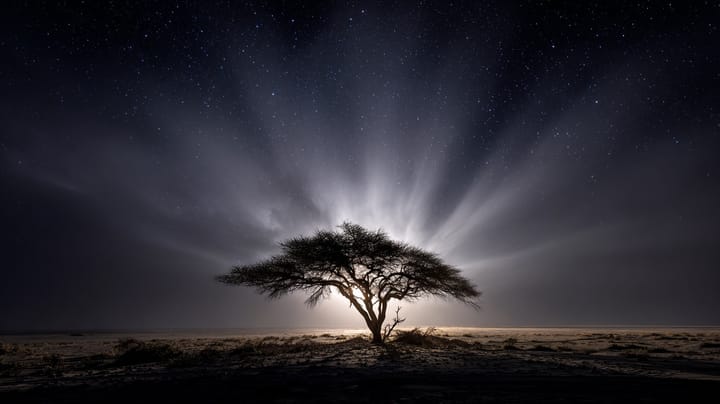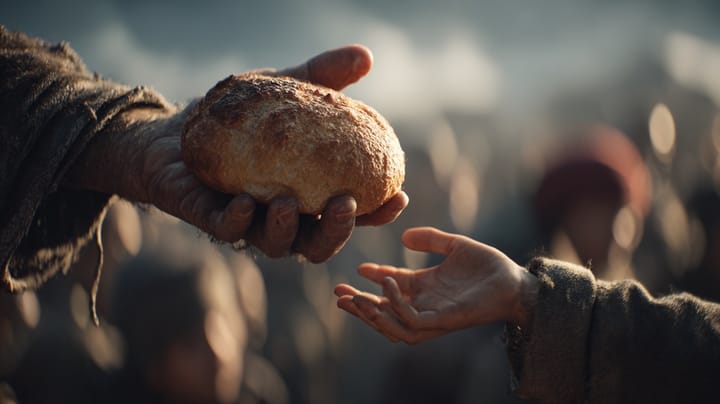Fairhaven Sermon 7-23-2023
Summary
In this sermon, Rev. Dylan Parson discusses the biblical story of Jacob and his vision of the ladder to heaven. Rev. Parson points out that Jacob was a deceitful person who tricked his brother Esau out of his inheritance. Yet even when Jacob is fleeing his brother’s wrath, his father Isaac blesses him and God appears to Jacob in a dream promising to be with him.
The sermon emphasizes that God is always present in our lives, even when we do not perceive it. Just as Jacob realized God was present in the ordinary place he stopped to sleep, we should open our eyes to see God’s presence in the everyday moments of our lives. God is always with us, guiding us, even when we are not aware of it. We simply need to realize, like Jacob, that the Lord is in this place and we did not know it. Wherever we go, God is there.
Transcript
So you didn’t hear me last Sunday on Jacob and Esau, our first iteration of where Jacob and Esau show up, the sons of Isaac and Rebekah. So I’ll give you the gist of it. And that’s basically, I don’t like Jacob. That’s a big part of it.
I don’t think that’s an incredibly brave opinion either. I don’t think the story is written in such a way that you’re supposed to like Jacob. Jacob is a snake. In last Sunday’s Old Testament reading from Genesis, we heard this famous tale, one of the big ones of the Abraham cycle, of Jacob stealing Esau’s inheritance as firstborn.
He waits until Esau has this weak moment. He’s really hungry, to be specific. And Jacob gets his brother to agree to hand over his birthright, his inheritance as firstborn son, in exchange for a nice hearty bowl of lentil stew. And Jacob has been a schemer and a striver since literally the very moment he was born.
He was born trying to weasel his way into the firstborn position. He is born yanking on Esau’s foot. Esau comes out first, the twin boys are being born, and Jacob reaches for his brother’s foot trying to throw him behind so he can be the first one born, So he can get this great inheritance from his father. Jacob, who is his mother’s favorite, Rebecca, has no interest in being in second place at any time in his life.
While Esau seems like more of an agreeable, if kind of dumb, oaf, he’s his father’s favorite. He’s a hunter. He’s a simple guy. Anyway, whenever we meet Jacob this morning, the major reason that he’s on the road– so he’s in the middle of the desert outside Beersheba– The major reason that he’s on the road to this other village of Haran is ostensibly to go stay with a relative of his mother’s for some time.
He’s hoping to find a wife among his cousins, which is weird to us now, but wasn’t then. And but really a major factor here is that he’s running away from his brother. Esau is justifiably considering killing Jacob because Jacob has not only swindled him out of his inheritance, Jacob has done more since then. So we skipped a couple chapters between last week and this week.
In the meantime, Jacob has also impersonated Esau to try to receive his father’s deathbed blessing. This is even more devious than the whole lentil stew episode. So Jacob, if you don’t know this story, Esau is notoriously hairy. That’s his whole thing.
So Jacob wears fur on his arms, animal fur on his arms, and he comes up to his blind father Isaac and asks for his blessing to try to convince Isaac that he’s his hairy brother. He says, Feel my arms. So I don’t feel bad now that Jacob has stolen these things now that he’s wandering through the desert alone. He’s spending the night in a cave with a rock as his pillow, and he kind of deserves it.
Jacob is terrible. He has this drive and this talent for deceiving and defrauding even his own family. And it’s hard to think that it’s anything but well-deserved, that maybe for the first time in his life, he’s feeling fear. He’s feeling vulnerability.
He’s experiencing the concern that he might suffer the way he’s making other people suffer. And yet, we find at the beginning that he doesn’t leave under cover of darkness. He doesn’t leave in fear. He doesn’t flee into the night so no one knows.
He’s always been his mother’s favorite, we know this, but even Isaac, in the midst of this stealing of the blessing of the inheritance, has an enormous amount of grace for Jacob. Before sending him away, he’s being sent away to diffuse the tension, you know, Isaac and Rebecca don’t want their sons killing each other. Isaac calls Jacob in to receive a blessing for the journey. And this one, he gives him voluntarily.
These are verses three and four. Isaac says to Jacob, God Almighty will bless you, make you fertile. He’ll give you many descendants so that you will become a large group of peoples. He will give you and your descendants Abraham’s blessing so that you will own the land in which you are now immigrants, the land God gave to Abraham.
Isaac is just overflowing still with grace, with love for his complete jerk of a son. And he promises that God is even more so. But it seems like as Jacob leaves, he doesn’t really believe it. Maybe finally, as the consequences of his actions are finally catching up to him, he’s on the run, maybe he’s feeling some guilt.
It’s worth pointing out that, you know, even though he receives this blessing, Jacob doesn’t really seem to have much of a relationship with God at this time. In fact, the only reference to God that Jacob has made to this point, you know, he’s probably in his 30s now, the only reference to God that he has made to this point is found in chapter 27, while he’s impersonating Esau, while he’s wearing the hair on his arms, Blind old Isaac asks Jacob, as he’s pretending to be Esau, how he was able to hunt and prepare an animal so quick to bring him dinner. And Jacob actually lies to his blind, innocent father about God and says, the Lord your God led me right to it. And I found this deer because God sent me to it, which is just lie upon lie upon lie.
This is a notably terrible instance of Jacob taking the Lord’s name in vain in order to manipulate other people. And so even Jacob’s relationship with God, if one really exists, is rooted in lies and deception. And so in the desert outside Beersheba, with his head on a rock pillow, maybe Jacob has some sense that he’s finally reaping what he sowed. And so having gone as far as he could for a day’s journey, he makes camp for the night.
He plops his head on that rock. And that’s the closest thing to comfort he can muster up in the desert. He’s having a terrible time. But somehow he falls asleep.
And then he has a vivid dream. Jacob saw a raised staircase, its foundation on earth and its top touching the sky. And God’s messengers were ascending and descending on it. And suddenly the Lord was standing on it and saying, I am the Lord, the God of your father, Abraham, and the God of Isaac.
I will give you and your descendants the land on which you are lying. Your descendants will become like the dust of the earth. You will spread out to the west, the east, the north, and south. Every family of earth will be blessed because of your descendants.
I am with you now. I will protect you everywhere you go, and I will bring you back to this land. I will not leave you until I have done everything that I have promised you. This isn’t a confusing or abstract dream.
He doesn’t need anyone to interpret it for him. It’s not impersonal or distant. This is a message straight from God. And that’s really unusual in much of the Old Testament.
You usually get word from God from an angel or from a voice, but God is standing on this staircase talking to Jacob. Jacob might have pretended to hear from God before, you know, to trick people. But now, amusingly kinda, God seems to introduce himself. He goes, I’m God.
I’m the God of Isaac, the God of Abraham. And God makes it very clear that he actually is with Jacob. Jacob has lied about it before, but actually, God is there. The Lord meets Jacob, this complete jerk who has not known God before as anything but a card to play.
He meets him in the wilderness in this moment of complete displacement, uncertainty, exile from everything and everybody he knows. And God’s been with him all along. Imagine as Jacob sees these angels, these messengers climbing up and down the staircase to heaven, touching the earth right next to where he now lies. He realizes, I have never been on my own.
All of this striving, all of this scheming, Not that he’s gonna let any of that go anytime soon, as we read forward. But his life has been in God’s hands all along. God moves him towards fulfilling the promise that he made to his grandfather, Abraham. And so it’s kind of funny in a way that Jacob names the place that he’s in, this cave, this spot in the desert, he names it Bethel, which means the house of God.
It’s not as if this random cave is the gate to heaven. This is not the place where the angels come and go. On the contrary, wherever Jacob is, there’s God. This is just the first time he’s seen God there.
Listen to verse 16. When Jacob woke from his sleep, he thought to himself, the Lord is definitely in this place, but I didn’t know it. Wherever he walks is holy ground and it always has been. The same way this spot right here and your life and my daily life is holy ground because God is with us.
Not just Sunday, not just in the sanctuary, every spot, every moment is a place where heaven and earth meet, where there’s a staircase between earth and heaven. God is not far away. All sorts of people, Christian or not, this is a human universal, seem to look for experiences of God at what have been called thin places, if you’re familiar with that term. These places where heaven and earth seem closer together than elsewhere.
And there is something to that. Humanity has made pilgrimages for millennia to try to meet God in a special way. Think of the millions of Catholics who go to places where a vision of the Virgin Mary has been sighted. They go there because they want to see God in some way.
Think of Christian travelers who go to remote windswept British islands that are dotted with monasteries to learn how to pray. Or think of the people who make trips to Jerusalem to walk where Jesus walked. They go there because they want to see God in a different, closer way. Or closer to home.
Think of places like Jomonville, where children and adults alike feel they’ve gotten to know and meet Jesus in a special way, different than in day-to-day life. But that’s a matter of our perception, not of how present God actually is. God isn’t actually closer to us in these places that feel magical to us. God’s right here.
Like Jacob, it’s hard for us to notice the angels ascending and descending right in front of our noses until we get some mystical vision of it happening. And then we find that we’re surprised that God is with us all along because we so rarely feel it. The famous priest and writer Thomas Merton tells of an experience that he had as a young man in 1958. He was walking among shops on the corner of 4th and Walnut Street in the very non-magical city of Louisville, Kentucky, on a perfectly average day.
And he remembers in the midst of shopping, just buying stuff, getting some shoes, whatever, He was suddenly overwhelmed amidst the crowds on the sidewalk with love for all the people around him. He was just overflowing with love for all of these strangers that he didn’t know while he was out buying shoes. The holiness of that very regular place of these people he’d never see again in his life just overtook him. Now if you’ve been a Methodist for even a couple years, I’m sure you’ve heard the similar story that marked the moment of John Wesley’s transformation in 1738.
He wrote in his diary, In the evening I went very unwillingly to a society in Aldersgate Street where one was reading Martin Luther’s preface to the Epistle of the Romans. Doesn’t start out very magical, right? About a quarter before nine, while he was describing the change which God works in the heart through faith in Christ, I felt my heart strangely warmed. I felt I did trust in Christ, Christ alone for salvation. An assurance was given to me that he had taken away my sins, even mine, and saved me from the law of sin and death.
It’s not that John Wesley had never met God before that time. It’s not that God wasn’t there until that moment. That was the moment he opened his eyes and could see. And I can tell you that for me, I’ve had at least one moment like that myself.
Whenever I was 18, between high school and college, Stormy and I went on a mission trip to Guatemala. We were in El Quiche, which is a northern region. Lots of Maya people live there. Almost nobody speaks Spanish.
They’re all Maya Indians. And our host took us up to a hill outside town. You can see for miles across the valley, just this flat valley surrounded by high, cold mountains. And this hill had always been a significant landmark in the area.
For a very long time before Christianity came to dominate, it had been the site of sacrifices. It was like a pagan temple. They would sacrifice animals, things like that there. Later in the 1980s and ’90s, it was a fort and an outpost during the Guatemalan Civil War.
That was a genocidal war. It killed like 200,000 people. And standing in that spot at sunset on this place that had been a temple, that had been a fort, looking out over an enormous cemetery on one hand and this village in front of us and thinking Thinking about all the dark history that had flooded this place, I had this sense, this overwhelming sense, that Jesus is the hope for healing and redeeming the whole world, the only hope. And I wanted to devote my life to being part of that work.
So here I am. That was the moment where things started to shift. And it can be tough to hold on to, but here is the key day after day. The Lord is definitely in this place, but I didn’t know it.
Wherever you are, wherever you go, whatever challenges and joys you encounter in your days, whoever you have been, for better or for worse, God is right here, right there. And God’s angels, God’s messengers are ascending and descending right in front of you. If you go up to heaven, he’s there, the psalm tells us. If you descend to the depths of hell, he’s there.
If you fly to the far side of the sea, if you are hidden in deepest darkness, he’s still there. The love and the promise of God is yours. On this day I pray that you will receive and perceive that presence in a new way. Open your eyes and see the God who has never left you alone.
In the name of the Father, and the Son, and the Holy Spirit. Amen. [BLANK_AUDIO].


